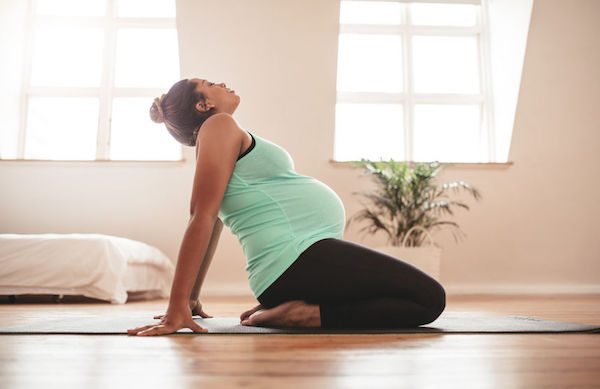For years it was believed that exercise during pregnancy is a no-no. We now know that the physical and mental benefits are undeniable. But how much is enough, and which exercises are safe?

If you’re an athlete you can most likely continue with the sport you’re skilled at right into the second trimester, or beyond, as long as you have your doctor’s OK, feel comfortable and keep hydrated. It’s the less fit and active who tend to need some advice when it comes to exercising while expecting, especially if they’ve been notoriously inactive before falling pregnant and now are determined to be as healthy as possible for their baby. The American College of Obstetricians and Gynaecologists (ACOG) promotes regular exercise for its “overall health benefits”, adding that this behaviour modification can play a role in “preventing or managing gestational diabetes”. Each patient does however require a medical evaluation and clearance from their doctor.
The best exercises for pregnant women
According to Dr Laura Goetzl, who specialises in high-risk pregnancy, sensible choices for pregnant women include walking, cycling (especially on a stationary bike), low-impact aerobic classes, swimming and yoga. The benefits of participating in these activities include better posture and the alleviation or avoidance of back pain as your centre of gravity shifts; avoidance of injuries related to the effect of the hormone relaxin on the ligaments, which weight training greatly assist with; less swelling or bloating from water retention; as well as improved body image and more controlled weight gain.
Tips for exercising while pregnant
Thirty to 40 minutes is a good duration to stick to for aerobic sessions, while you can safely do non-aerobic training (such as weight training, with the necessary modifications) for up to an hour. International health regulatory bodies recommend the accumulation of 30 minutes or more of moderate intensity physical activity on most, and preferably all, days of the week; and recognise that more intense exercise performed in 20- to 60-minute sessions on three-to-five days a week will result in higher levels of physical fitness. “Despite the fact that pregnancy is associated with profound anatomical and physiological changes, there are few instances that should preclude otherwise healthy, pregnant women from following the same recommendations,” they say. Just remember to stay hydrated by drinking plenty of water or juice; the latter may help to maintain blood-sugar levels during longer sessions.
Your gynae may advise you to keep a watch on your heart rate with the use of a monitor. You can work out your maximum heart rate by subtracting your age from 220 (i.e. 220 minus 35 = 185) and then working out your target heart rate range of 60 to 80 percent of max if you’re fighting fit, or 50 to 60 percent if you were previously rather sedentary. It’s also not advisable to lie flat on your back for stomach exercises, as this can restrict blood flow to the baby. Rather ask your instructor to assist you with various adaptations, such as lying on your side or sitting against a wall for core work.
Other sensible considerations:
- Avoid overheating. Rather exercise in the early morning or later afternoon, or try an aqua aerobics class
- Wear a supportive bra
- Drink liquids before, during and after your session, even if you trained in the pool
If you switch to swimming or aqua aerobics in that last trimester, when other forms of exercise may feel less comfortable than before, you will also benefit from the effects of immersion in reducing oedema, preventing you from overheating, and avoiding joint injuries due to your buoyancy. Despite the extensive changes experienced during pregnancy, continuing to exercise regularly has minimal risks and confirmed benefits – top of these being an enhanced mood – for most women. Additionally, your fitness instructor may well become an important part of your support system at this special time.
Avoid these sports and activities:
- Contact sports, like soccer or netball
- Scuba diving
- Gymnastics
- Horse riding
- Downhill or water skiing
- Preterm labour
- Vaginal bleeding or amniotic leakage
- Headache
- Chest pain
- Muscle weakness
- Dizziness or breathlessness
- Decreased foetal movement
- Calf pain and/or swelling
IMAGE CREDIT: 123rf.com

